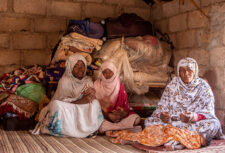James Fookes, ATMG Co-ordinator, explains our concerns around the Nationality and Borders Bill.

The Nationality and Borders Bill passed through the House of Commons unamended late last year. It is now making its way through the House of Lords where discussions on amendments to part 5 of the Bill will take place.
The Bill as a whole represents a dangerous and regressive move in the UK’s attitude to asylum, human rights and the victims of trafficking. It is enhancing the failed hostile environment policy, which has already caused untold suffering and hindered the UK’s efforts to be a true world leader in tackling modern day slavery. Part 5 of the Bill, which concerns modern slavery and human trafficking is however of particular concern.
Over the past decade, NGOs, survivors of modern slavery and the British government itself have sought to rightly separate modern slavery from immigration. This Bill now represents a step backwards, conflating immigration enforcement with trafficking prevention and victim support. This is wrong; modern slavery does not belong in an immigration Bill.
The measures in this Bill will not, as the Home Office claim, protect victims of modern slavery. Rather, it will harm victims of modern slavery. The sector is unified on this. The Bill harms victims by creating a harsher system for survivors with higher thresholds. This means a greater risk of support being rejected.
Survivors of modern slavery could be denied access to the support that will enable them to access safety and recover and rebuild due to an unreasonable evidence burden. This is exacerbated by the priority given to immigration enforcement. Measures in this Bill will put a duty on the police to arrest and prosecute anyone identified by them, for instance in a nail bar, brothel or drug farm, who is undocumented.
The Bill introduces cruel ‘trauma deadlines’ by putting a time limit on when survivors must disclose their experiences, after which they are assumed to be lying and their credibility is damaged. This would be inhumane. It can take a person years before coming to terms with the trauma they have undergone and be able to disclose their exploitation. Damaging the credibility of a survivor for not disclosing within a time frame is quite simply punishing them for their trauma.
The Bill would therefore block access to support and criminalise victims and survivors who have criminal records, despite 49% of potential trafficking victims last year being forced to commit crimes. This will limit survivors’ ability to support in prosecutions and allow traffickers to evade justice.
Part 5 of the Bill ultimately removes protection hard won through the Modern Slavery Act, ignores the best practice in safeguarding and victim support, ignores the recommendations of the police, the findings of the 2018 super complaint on data sharing, the warnings of the Independent Anti-Slavery Commissioner, the expertise of NGOs and the experiences of survivors.
Instead, the Bill continues to focus on immigration enforcement and forcing modern slavery to fit inside the hostile environment. This is not only cruel it is simply administratively unworkable.
Quite simply: Part 5 of the Bill should be scrapped.





